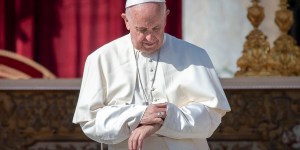It’s time to return to Perpetual Adoration after the pandemic, and the world needs it now more than ever.
At Sacré-Cœur Basilica in Paris, the COVID-19 pandemic never stopped its 135-year perpetual adoration tradition, but it was hard. At parishes like Blessed Sacrament Parish in Wichita, Kansas, it took a lot of phone calls to restart the practice. At my own St. Benedict’s Parish in Atchison, Kansas, the pastor’s goal is to restart Perpetual Adoration in the chapel that touched countless lives.
The hard part for any perpetual adoration chapel is finding late-night and early-morning adorers. But there are great reasons a difficult hour is actually better. Here are eight.
1: To obey what the Lord specifically asked.
In his Agony in the Garden, Jesus told the Apostles “My soul is very sorrowful, even to death; remain here, and watch with me.” When they slept instead, he said, “So, could you not watch with me one hour?”
It has always been a matter of shame and sadness that, in his hour of greatest need, his friends grabbed an hour of extra sleep. But it’s never too late to change our answer and fulfill his often repeated commandment to “Watch and pray.” (Here’s a minute-by-minute guide for praying a Holy Hour.)
2: To be an example for others.
I’ve written before about how my life was changed by obituary coverage of Tom Vander Woude, the Virginia man who died saving his 19-year-old son with Down syndrome from a septic tank.
Among the many remarkable details of his life, I learned that he kept a 2 a.m. Holy Hour once a week, and to be more like him I kept one ever since, until the pandemic.
St. John Paul II said that, even when he himself was an old man, when he woke in the middle of the night he would remember waking as a child and seeing his father at prayer. That dad’s middle-of-the-night prayer changed the Church.
3: St. John Paul II was driven by the call for early morning prayer.
A constant prayer of the Pope was from Psalm 130, “My soul waits for the Lord more than watchmen for the morning,” George Weigel reports in his book Witness to Hope.
It was a basis for John Paul’s commitment to the idea that we are on the cusp not of a Great Apostasy but a New Springtime of the Faith.

4: The New Springtime is closer than ever.
I love the Holy Spirit logic that St. Paul uses, saying “where sin increases, grace abounds even more.” As Father Michael Gaitley put it, “Now is the time of mercy! In a time of great evil, God gives even greater graces. “It’s a time when God is making it in a certain sense easier to become a saint.”
Making the effort to do something difficult will pay huge dividends. “Trust is the shortcut to becoming a saint,” he said. “Trusting and trying. Even if you fall on your face a thousand million times, you can still become a saint if you keep trying.”
5: Trust God above all by offering reparation.
With the occult and attacks on Catholic churches rising in America, one of our most important spiritual duties is to offer reparation.
The idea is as old as St. Paul’s challenge to “fill up those things that are lacking in the sufferings of Christ.” Forty Hours of Reparation was how lay Eucharistic adoration started in the first place. The Fatima visionaries promoted the practice to millions by spreading the “Angel’s Prayer”:

6: Help restore faith in the Eucharist.
Polls famously show the shocking lack of understanding of and faith in the Real Presence of Jesus Christ in the Eucharist among Catholics. There are many ways to help restore it. A late-night hour might be the best. As Mahatma Gandhi said (according to Deacon Justin Moor’s sources):
7: God is never outdone in generosity.
“God will not be outdone in generosity,” said St. Ignatius of Loyola, and anyone who has kept a late-night hour has seen how true that is.
Before committing to a difficult hour, it looks impossible. While praying the hour, it seems to go by faster than any other Holy Hour. After praying the hour, the good effects it has throughout one’s life are impossible to miss.
8: To flood your life with peace and joy.
Many people have remarked that they avoid reading the news altogether now. It is too upsetting to see unprecedented challenges to the family, growing threats to peace, and attacks on the faith.
Psalm 88 describes a situation worse than ours. The solution is to “Cry out in the night” before God.
St. John Paul II said “We do not know what the new millennium has in store for us,” and only the Eucharist can assures us “that it is safe in the hands of Christ.”


